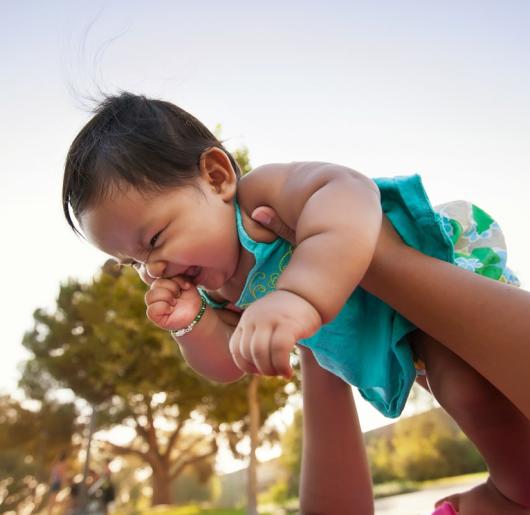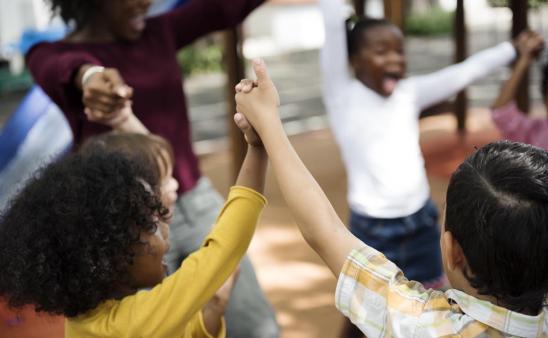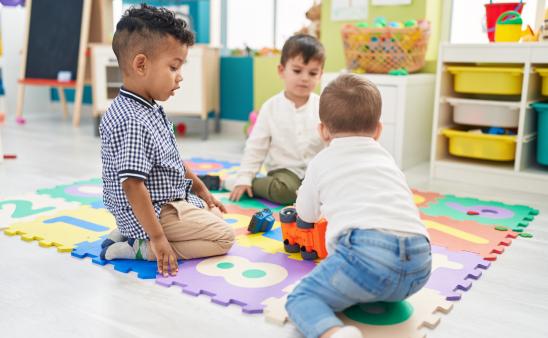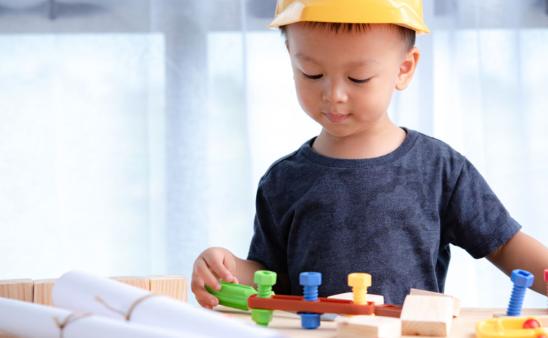DCYF is tracking federal actions that may affect programs serving Minnesota children and families. Get verified facts, current status, and how services continue.
Professional Development and Program Support
Supports are available to help child care and early education professionals and programs reach their highest potential.

Featured Opportunities



Professional development
The department contracts with local organizations to provide free and low-cost coaching, training and advising to early childhood professionals and businesses.
Minnesota's Knowledge and Competency Framework for Early Childhood Professionals outlines the skills, knowledge and abilities required of people working with young children.
There are three versions: one focused on infants and toddlers, one on family child care providers, and one on preschool-aged children in center and school programs. All versions include the skills needed to work with young children, with more specific skills added for the area of specialization.
The state offers Mental Health Consultation, a mental health prevention service focused on building the adults' capacity to support infant and young children's emotional development and to prevent, identify or reduce mental health challenges.
Mental Health Consultation includes a combination of training, skill building and reflective support (active listening, exploration of the provider’s beliefs and feelings, and problem solving) to promote the social and emotional health and wellbeing of not only young children and their families but the providers themselves.
Learn more from the Department of Human Services.
There are many ways to join and grow in an early childhood career. Entry-level roles, certifications, professional development and higher education are all options to help you reach the positions you want. Explore early childhood careers.
Resources for high-quality care
Minnesota’s early learning standards are called the Early Childhood Indicators of Progress (ECIPs) and are aligned with the kindergarten academic standards. The ECIPs are a tool for early care and education programs to plan curriculum, instruction, assessment and professional development activities.
Developmentally appropriate, state-approved prekindergarten assessments are a critical part of Minnesota's Comprehensive Assessment System. These high-quality, standards-based assessments produce valid and reliable data that can help teachers, administrators and families understand what students know and are able to do, supporting their success in school and beyond. Learn more about Minnesota's four state-approved assessments.
There are easy steps and resources early educators can take to make their spaces more inclusive to children with disabilities. Creating Inclusive Child Care Spaces is a guide to help providers think more inclusively about children with disabilities, and provides easy to access steps and free resources to improve care for children with disabilities. Creating inclusive spaces is especially important for children with disabilities, whose families often struggle to find care who meet their needs. As an educator you can positively impact these families and grow your business by providing quality child care. Learn more by reading the guide.
The Child Care Assistance Program can pay a higher rate for children with special needs if children require higher levels of care for their age due to a physical, behavioral or medical disability. The disability must be documented, and the provider must explain why the child needs a higher than normal level of care, what their extra costs are and what steps they have taken to meet those needs. To ask for a special needs rate for an individual child, the parent and provider must complete the CCAP Special Needs Rate Variance Request DHS-4194 (PDF), include proof of the child's special needs due to disability and submit the form to the child's case worker.
Additionally, the Center for Inclusive Child Care offers a number of resources to help early educators create inclusive spaces for all children.
Early childhood is a vital time in an emerging bilingual child's life to build foundational language and literacy skills as they transition to kindergarten. The Minnesota Department of Education (MDE) supports local educational agencies and early childhood programs in promoting equitable language access support for multilingual learners from culturally and linguistically diverse backgrounds. Learn more on the MDE website.
Early educators can use outdoor spaces to support the learning of all children. Many studies show outdoor learning can increase feelings of well-being, sustained attention and concentration. The benefits of outdoor learning for children are well documented and range from promoting physical health and well-being, to supporting social emotional development, to providing ample activities to meet academic standards in developmentally appropriate ways.
Find resources to support outdoor and nature-based learning opportunities.
Children and families experience early care and education across a variety of programs, providers and settings. The state of Minnesota is working to help early care and education providers across this "mixed delivery" system coordinate services and share resources. Find resources and support.
Additional resources and support
When you care for the children of family, friends or neighbors, you are providing critical support in helping families and the community thrive. You are more than a babysitter; Family, Friend and Neighbor (FFN) caregivers are a critical part of the child care and early education workforce. The departments partners with grantees across the state to support these caregivers, including culturally appropriate training and resources. Learn more on the FFN Minnesota website.
The Minnesota Tribal Resources for Early Childhood Care (MNTRECC) provides technical assistance and support to Tribal child care programs throughout the state of Minnesota. MNTRECC serves as a foundation and link where child care and other early childhood programs can access resources, information and get technical assistance. Their goal is to enhance and strengthen the child care delivery system for Native American children and families throughout the state of Minnesota. Services are provided in cooperation with the Child Care Aware Minnesota and Minnesota Tribal Child Care Programs.
The Department of Children, Youth, and Families is committed to supporting a workforce that mirrors the rich tapestry of our state, fostering inclusivity and a sense of belonging for every child and family. Learn more about workforce studies and initiatives to improve compensation.